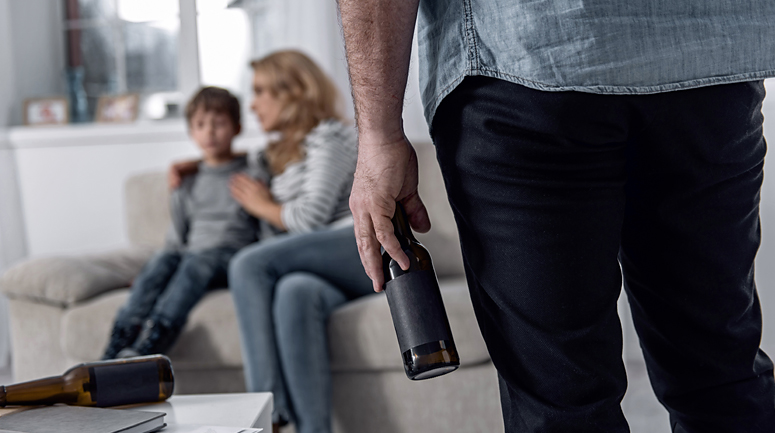The Difficulties of Living with an Alcoholic
Living with a loved one struggling with alcohol use disorder (AUD) can be tough, not just for them but for you, your home life and family. Unpredictable mood changes and behaviours can be very distressing to experience especially when you simply just want to help them.
When it has become a constant shadow in your home, it can lead you to feelings of helplessness, anger, or despair. This is why it’s important to take care of yourself and set healthy precautions. Read on to learn how to navigate and better support your loved one suffering from AUD.

Am I Encouraging Alcoholism?
Alcohol addiction can be enabled by loved ones without them being aware of it. Most of the time, this is unconsciously done out of genuine care or to “keep the peace” at home. However, it’s important to separate actions that help the alcoholic from actions that only tolerate and enable their alcoholism more.
Most people fear leaving the alcoholic alone out of concern, and in turn, the alcoholic can become highly manipulative towards them. This only perpetuates an unhealthy cycle for everyone concerned living in the home.
Here’s how to find out if you may be unintentionally enabling them:
- Do you give them loans or financial support?
- Do you take care of their responsibilities (for example: paying for their bills, handling their chores, doing their work)
- Do you make excuses for their behaviour?
- Have you turned a blind eye to their growing alcohol addiction?
If you find yourself agreeing to these questions, do this instead:
- Remind them that you love them, but you are no longer allowing their alcohol addiction to keep going
- Talk to them with compassion about how damaging their alcoholism is to them and their surroundings
- Encourage them to seek out professional help or enter an alcohol rehab program to speed up their recovery

Things to Remember When Living with an Alcoholic
Talking to your friend about their drinking can be tricky especially if you drink as well. In order for your conversation to be fruitful with them, here are some of the best ways you can approach them.
Set boundaries
Don’t be afraid to set strict and healthy boundaries with your loved one. It’s important to prioritise your own well-being and protect yourself, especially if there are also children or elderlies at home.
The danger of not setting these boundaries is that you might be overwhelmed with the destructive behaviours of your loved one or even participate in the addiction itself. Seeing it with your loved one can be distressing, but constant exposure to it without prioritising your well-being can also be damaging long term.
Here are some general ways you can set boundaries:
- Do not permit alcohol in the house
- Don’t allow drinking buddies to stay at home with them
- Do not permit foul language in the house
- Do not give any money that they may use for alcohol
Remember, while you may not be able to completely change your loved one’s addiction, you can firmly set what kinds of actions you are willing to accept in your home life.
This may not all apply to your situation, but setting one or two boundaries can immensely make your life healthier without the shadow of alcohol addiction darkening your home and everyone in it.

Look after yourself
Don’t neglect your own health and those of other loved ones in the family. If it’s almost impossible to do this while sharing a home with an alcoholic loved one, you can detach and stay with other family members or friends instead.
The goal here is to look after yourself by detaching from their destructive behaviour. Another side to this is that they might also realise the damaging consequences of their alcoholism and seek professional help.
Here are some ways you can nourish yourself while living with an alcoholic:
- Spending time with hobbies and novel activities that spark joy
- Talk to a mental health counsellor and unburden your struggles
- Connect and bond with other valuable people in your lives like family or friends
Doing this can help you reclaim your sense of self and detach from the destructive shadow of alcohol addiction in your home life.

Talk to others in a similar situation
Seeking a safe space where you can open up about your personal struggles is very important. And one of the best ways to do this is by joining a support group like Al-Anon, which is a support group specifically for friends, loved ones, or family members of alcoholics. This way, you can share openly and get some comfort from people who know firsthand what the experience is like.

Fast Access to Residential Treatment
We are currently able to offer fast access to private inpatient treatment.
Please call us today and speak to one of our expert advisors.
Call today in confidence: 0800 0148 970
Do’s and don’ts when living with an alcoholic
Below are some practical tips and advice on how to make life easier for everyone in the home when living with an alcoholic.
Do:-
- Encourage your loved one to talk about their problems
and why they resort to alcohol as an escape - Create a space at home where you can relax and live
without the presence of alcohol - Prioritise your own health and that of any children or
others living in the home
Don’t:-
- Offer money that they will only use to buy alcohol
- Drink alcohol with loved ones or friend in the home
- Buy alcoholic presents for them or your loved ones
- Make excuses for the behaviour of a loved one with
an alcohol use disorder
Alcohol is a depressant that can powerfully influence people to adopt highly destructive behaviour patterns. And while it greatly affects families, these families can also bring about powerful change to their loved ones suffering with alcohol addiction.
Even if it is hard to live with an alcoholic loved one, to better support them means that you don’t allow and enable their alcoholic addiction and behaviours to go on in your home life.

How to Help Someone You Live with Consider Quitting Alcohol
Like any other addiction, people suffering from alcohol use disorders should be the ones to decide and seek support for themselves. When they realise how alcoholism has taken over their life and firmly decide to change, that’s where your support comes in. Your role is not to decide for them but to encourage them instead once they finally do this first but crucial step.
The best way to support them is by becoming a positive influence, and if they don’t know where to start, you can try to point them in the right direction. You can do this by encouraging them to learn and research how to stop drinking safely and the various treatment options available.
FREE Alcohol Addiction Assessment
If you or a loved one are struggling with alcohol addiction, we understand the challenges you’re facing and we’re here to offer compassionate help.
Our highly trained advisers are available to speak to you right away, simply call 0808 252 3379 today.
We can discuss your concerns in complete confidence, explore the options for treatment, and help you to understand what will work best for you.
We’ll also help you to book your free alcohol addiction assessment there and then, with appointments usually available within only a few days.
We understand that taking the first step can be the most difficult, but we’re here to support – with no pressure or judgement.
Professional and compassionate help is just a phone call or click away.
More information about supporting your alcoholic loved one
Below is some additional information about different kinds of situations you may find yourself in when living with an alcoholic loved one.
How to help an alcoholic partner
The influence of alcohol can strain your relationship with your partner and test your love for them as well. The best way to help an alcoholic partner towards recovery is by helping them understand and realise the effects that alcohol is having on the relationship. But in order for them to listen rather than be reactive, the best form of action is to talk to them once they are sober and not when they are drinking
How to help an alcoholic parent
This can be a distressing situation because this greatly affects the children’s mental and emotional health as well as their development. The duty to seek professional help should be from the parent, and it can be hard for kids to do this on their own. If you’re under 18 and don’t know where to start, you can read our support guide on how to help an alcoholic parent.
How to help an alcoholic sibling
Alcohol addiction can also affect brothers and sisters in a family. This can be particularly hard to deal with especially if you have other family members to take care of as well. The best way to seek support is through talking to your parents, your siblings, partner, or to a medical professional.




